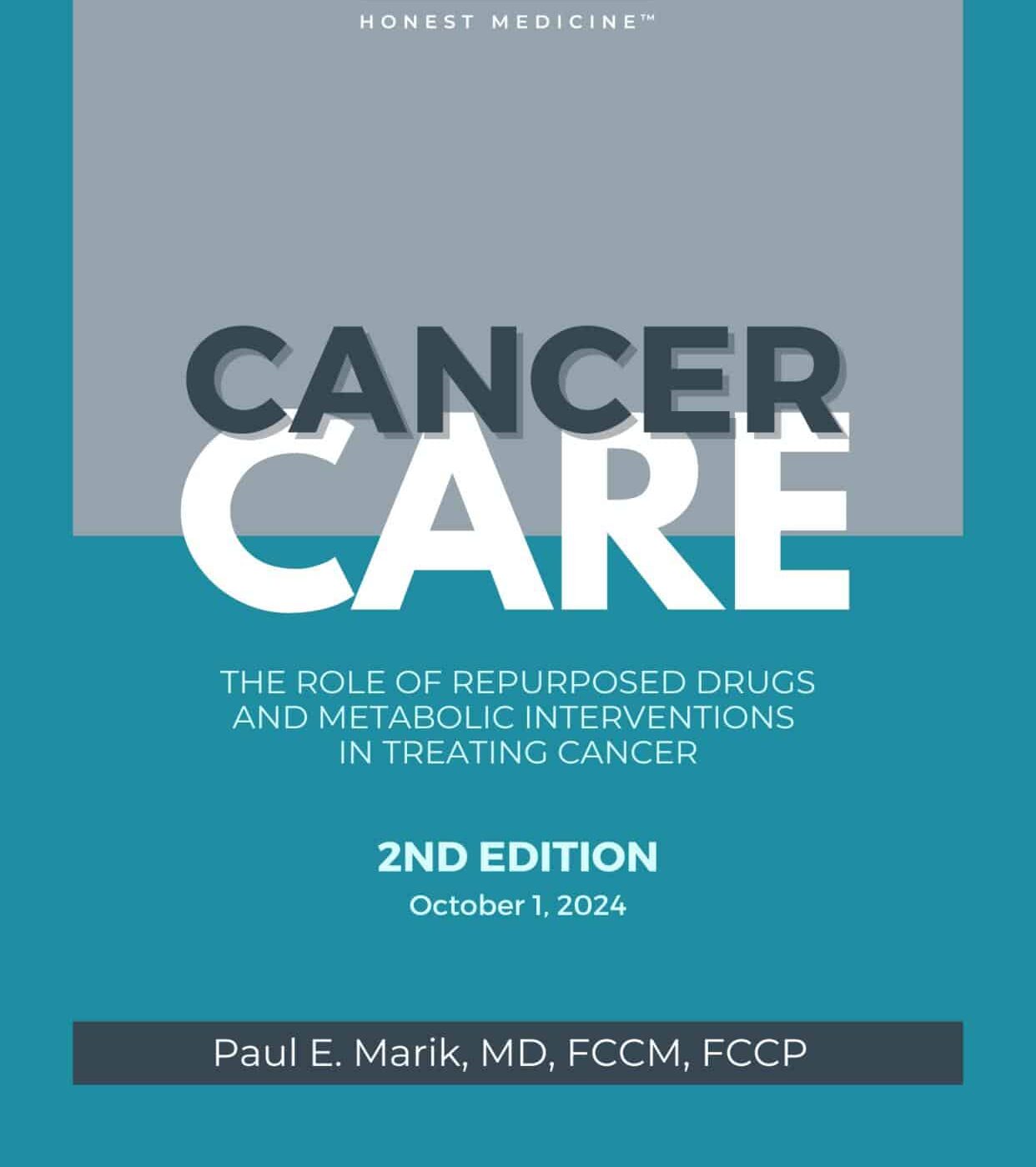Have health authorities misled the public about the safety of COVID-19 vaccines during pregnancy? Protect yourself and your baby by learning the truth.

If you’re pregnant or know someone who is, you might be questioning the prevailing advice about COVID-19 vaccines. Despite strong endorsements from the CDC, NIH, and various pregnancy-focused health associations, as of July 2024, only 13% of pregnant women are choosing to get vaccinated.
These organizations maintain that the vaccines are safe and effective for expectant mothers, citing only minor and rare side effects. Yet, the low uptake among pregnant women raises questions: If the vaccine is as safe as claimed, why are so many hesitant?
This discrepancy between professional recommendations and public action underscores a broader debate. Some voices in the medical community, diverging from mainstream health narratives, present concerning data.
For instance, Dr. Kimberly Biss, in a recent episode of the FLCCC Weekly Webinar, shared findings from independent studies and her own clinical data suggesting a link between the vaccine and increased miscarriage rates. The video clip below features Dr. Biss explaining why the COVID injections should never have been recommended for pregnant women:
Dr. Biss along with Dr. James Thorp and Dr. Peter McCullough, tackle this issue in their forthcoming study, “Are COVID-19 Vaccines in Pregnancy as Safe and Effective as the U.S. Government, Medical Organizations, and Pharmaceutical Industry Claim?”
Released as a preprint on June 27, 2024, this study represents the first part of a three-part series aiming to challenge and reshape the conversation about vaccine safety in pregnancy.
Questions About Vaccination While Pregnant? FLCCC Will Answer
Since COVID, it’s been tough for doctors and patients to have open and honest conversations. For a collaboration as delicate as pregnancy, this simply isn’t acceptable.
At FLCCC, it’s our mission to restore the doctor-patient relationship. Trusted experts like Dr. Biss, a seasoned OB/GYN with over 30 years of experience, are central to this effort. As FLCCC’s Senior Fellow of Obstetrics and Gynecology, she provides reliable guidance during these uncertain times.
Stay Connected and Informed with FLCCC:
- Sign Up for Our Newsletter
- Join The FLCCC Forums
- Sign Up for The FLCCC Weekly Webinar
- Explore Our Provider Database
Here’s what we’ll cover in this post:
- How COVID-19 Vaccination During Pregnancy Breaks a Longstanding Rule of Obstetrics
- What Do Health Authorities Say About COVID-19 Vaccines During Pregnancy?
- Examining the Data: A Critical Review of Vaccine Safety in Pregnancy

1. How COVID-19 Vaccination During Pregnancy Breaks a Longstanding Rule of Obstetrics
Before we explore the findings from Dr. Biss and her colleagues, it’s important to understand a longstanding rule in obstetrics: avoid introducing new substances to the body during pregnancy.
What does the label on virtually all nutritional supplements advise? “Consult your doctor if you are pregnant or breastfeeding.” If this caution is standard for vitamins, shouldn’t we expect the same level of prudence with something as significant as COVID injections?
This rule isn’t new—it dates back thousands of years to the era of Soranus, the Greek physician recognized as the first gynecologist. Soranus notably cautioned against using strong medications during pregnancy unless absolutely necessary. His advice represents an early manifestation of the precautionary principle that would much later become a formal part of obstetric practice.
All that is to say, if we follow the precautionary principle, there is little justification for getting vaccinated during pregnancy. Besides, if you are a woman healthy enough for pregnancy, a COVID infection poses little threat.
2. What Do Health Authorities Say About COVID-19 Vaccines During Pregnancy?
Most medical, government, and pharmaceutical organizations deem COVID-19 vaccines safe and recommend them for pregnant or breastfeeding women. Here’s exactly what it says on The American College of Obstetrics and Gynecology (ACOG) website as of July 2024:
When you read their recommendations, the ACOG seems incredibly sure of their position on COVID-19 vaccination during pregnancy. They are not alone—far from it, in fact. The NIH, CDC, and virtually every health authority claim the same thing: the mRNA vaccines are safe and effective.
Did the data ever show that to be true? There are now several reports questioning the validity of COVID vaccine trial data directly. On top of that, the vaccines were never tested on pregnant women before the “vaccine” rollout in early 2021. As our friends at the Canadian Citizens Care Alliance (CCCA) point out, health authorities inexplicably misled the public into thinking these products were already proven safe for pregnancy.
Starting midway through 2021, the studies began trickling in. Most of the studies promoted in the media were optimistic, some stating there are “no obvious safety signals” with the COVID vaccines in pregnant women. The trouble with these studies is that their results are not replicable with real-world data.
Let’s look at miscarriage rates in particular. This graph is made of data from the VAERS database, or Vaccine Adverse Event Reporting System. It shows that miscarriages spiked in people who took the COVID-19 vaccine while pregnant In 2021 and 2022 when COVID vaccine uptake was at its peak.
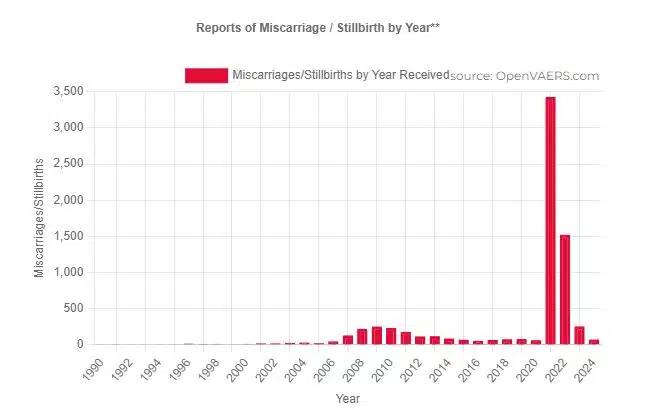
Dr. Biss also saw this trend at her own clinic. Miscarriages doubled for consecutive years and tapered off as people stopped getting booster shots.
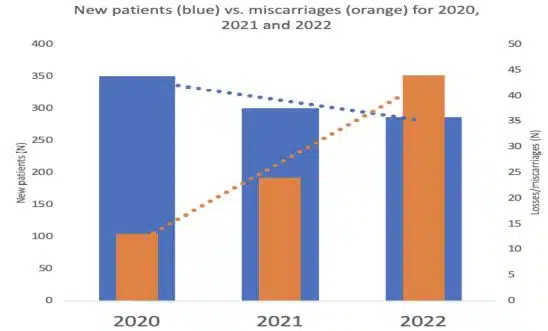
3. Examining the Data: A Critical Review of Vaccine Safety in Pregnancy
In their recently published preprint, “Are COVID-19 Vaccines in Pregnancy as Safe and Effective as the U.S. Government, Medical Organizations, and Pharmaceutical Industry Claim?”, Dr. Biss, Dr. Thorp, Dr. McCullough, and their colleagues undertake a critical examination of the safety and efficacy of COVID-19 vaccines in pregnant women.
The study analyzes data drawn from VAERS, focusing on reported adverse events related to pregnancy post-vaccination. The research design involves a retrospective analysis of the VAERS data to identify and quantify the incidence of adverse pregnancy outcomes reported following COVID-19 vaccination, compared to historical data on other vaccines.
In the study, the researchers focused on 35 “adverse events” found in VAERS for individuals who were pregnant when receiving the COVID-19 injection. They looked at the prevalence of adverse events in VAERS for the following groups:
- COVID Vaccines (40-month period)
- Flu Vaccines (412-month period)
- All Other Vaccines (412-month period)
When you look at the matrix of data from the study below, you’ll see numbers like “3494 / 315 / 936”. These numbers map to the list above. So, for the adverse event of miscarriage, the COVID vaccine is linked to 3494 events, the flu vaccine to 315, and all other vaccines to 936.
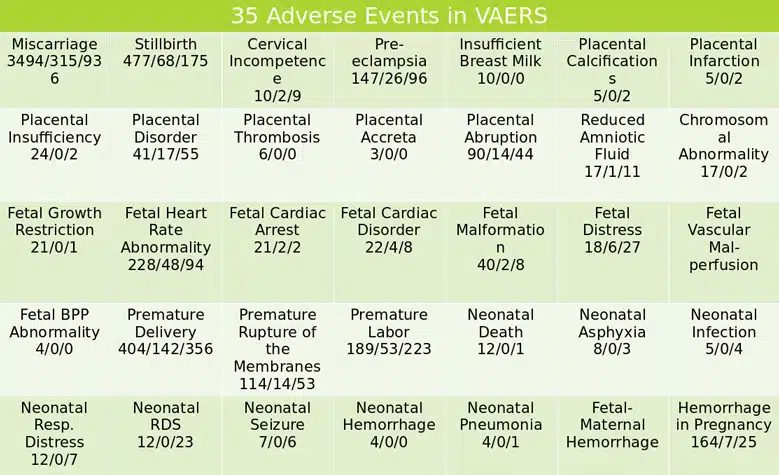
The data seems to suggest a strong signal of harm, shattering the narrative that COVID vaccines are safe and won’t affect your pregnancy. There’s more too. The researchers dug deeper into the data for each adverse event by looking at the proportional reporting ratio (PRR), which is a simple statistic used to compare how often a specific side effect occurs in people using one drug versus another.
When you look at the study data below, the PRR of “114” means that you are 114 times more likely to have a miscarriage when taking the COVID vaccine compared to the flu vaccine.
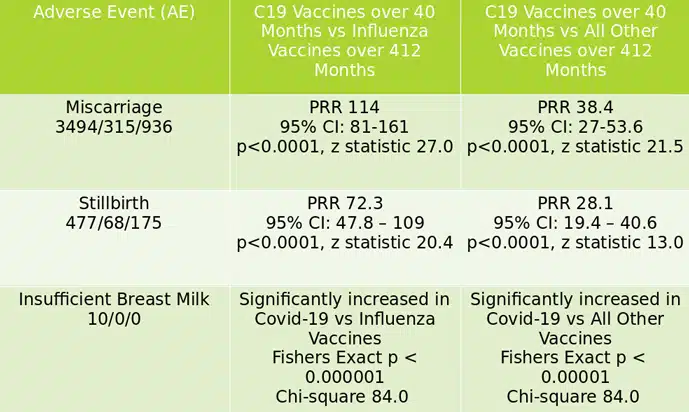
A New Path Forward
As we look into the complexities surrounding COVID-19 vaccines during pregnancy, it’s clear this topic needs careful thought from both medical experts and the public. Dr. Biss and her colleagues have uncovered data that challenge the usual perspectives on vaccine safety. Their research highlights the need for careful and open scientific study.
The information they’ve brought forward, particularly the high number of adverse events reported in VAERS by pregnant women who received the COVID-19 vaccine, calls for more discussion and analysis. While health authorities stand by the vaccine’s safety based on questionable data, alternative voices like Dr. Biss are cutting through the noise.
Rest assured, FLCCC will provide continuing coverage as this vital research evolves. Be sure to sign up for our newsletter, join our Forums, and sign up for our weekly webinar to stay updated.



